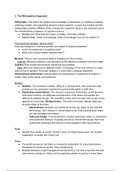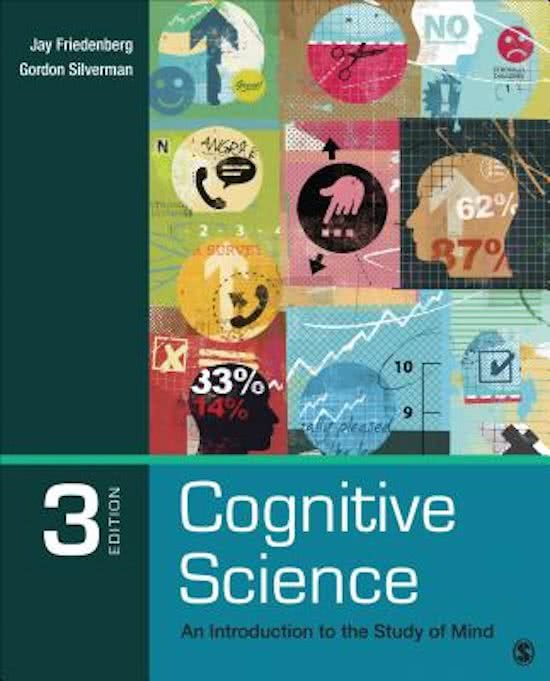2. The Philosophical Approach
Philosophy: The search for wisdom and knowledge. Is theoretical, by “defining problems,
criticizing models, and suggesting areas for future research”. It gives key insights into the
relationships between different areas of study and, therefore, plays a very important role in
the interdisciplinary endeavor of cognitive science.
● Metaphysics: Examines the nature of reality, mind-body problem
● Epistemology: Study of knowledge. What is knowledge, how do we acquire it?
The mind-body problem: what is mind?
How psychological or mental properties are related to physical properties.
● Is the mind physical or something else?
● What is the causal relation between them?
Monism: There’s only one kind of state or substance in the universe.
Aristotle: difference between mind and body as the difference between form and matter
Dualism: Both mental and physical substances are possible.
Plato: Mind and body exist in different worlds. Knowledge of the mind exists in an ideal
world of forms (perfect). The body resides in a world that is material (imperfect).
Philosophical behaviorism: Mental states are dispositions or tendencies to behave in
certain ways under certain circumstances.
Monism:
● Idealism: The universe is mental. “Brain in a vat argument”. We could never get
outside our own conscious experience to prove what reality is really like.
● Physicalism (materialism): The universe is physical. Democritus: all things were
composed of atoms, the attributes and behaviors of the atoms can explain the
differences between things. The operations of the mind are seen here simply as the
operations of the brain. Identity theory: The mind is the brain. Mental states are
physical states of the brain.
○ Eliminativism: Abandon our mental terms and rely solely on the scientific
terminology. Don’t believe in mental states at all. Only physical brain states
are acknowledged as existing.
○ Folk psychology: Commonsense or intuitive reasoning. Helps us understand
and predict the behavior of people around us. Churchland argues that it has
outlived its usefulness and that we should supplant it with neuroscience.
Pros:
● Simpler than dualist accounts: Occam’s razor; all things being equal, the simplest
explanation is usually the correct one.
Cons:
● The world is physical, but there is no physical explanation for many phenomena.
Sometimes it’s better to explain using mental terms.
● Multiple realization (argument against identity theory): You and I may both feel pain
when there’s activity in c-fibers, but the particular pattern of activity in those fibers
, and in other areas of the brain could produce radically different mental perceptions of
pain in each of us. Identity theory must account for all the subtle mental differences
that can exist between individuals.
Dualism:
● Classical dualism: Descartes: one-way causal link, with the mind controlling the
body. He thought the mind exerted its control on the body through the pineal gland
(one of the anatomical structures not duplicated on either side of the brain). Like a
puppet and puppet master.
● Substance dualism: Mind and body are composed of completely different
substances; mental and physical substances (Descartes’ classical dualism is
substance dualism).
● Pro:
○ Minds can do X. No physical object can do X. Therefore, minds are not
physical objects.
Cons:
○ If mind and body are of two different substances, then they should not be able
to causally interact. Pineal gland is where, not how they interact.
○ If mental states can be explained by biology terms there’s no need for a non
physical explanation
○ Does not give us an alternate explanation. What are mental things made of?
etc
● Property dualism: The mind and body can be of the same stuff, but have different
properties (characteristics/features).
● Con: Still fails to provide an explanation for mental states.
Cons:
● Ryle: The mind is not any particular component of the brain but, rather, all the parts
working together as a coordinated, organized whole.
● Clark: Dualism is uninformative and tells us what the mind isn’t rather than what it is.
● It postulates 2 worlds that must be coordinated. An explanation that does not violate
the principle of Occam’s razor would involve a single type of world, not requiring
coordination.
● The mental is integrated with the physical, the mind depends on the brain.
● Capacities once thought to be the exclusive domain of humans are now becoming
better understood computationally
Functionalism
Physical kinds of things: identified by their material composition only
Functional kinds: distinguished by their actions or tendencies
Mental states are not just physical states, but also the functioning or operation of those
physical states. A mind could conceivably be implemented in any physical system capable of
supporting the appropriate computation.
Significant implications (Garfield): The same mental state could be realized in quite different
ways in two separate physical systems (multiple realization theory).
, ● Conservative: Advocate direct connections between physical and computational
states
● Liberal: Emphasize computation over physicality; for both computers and thinking
organisms, the number of possible computational states always exceeds the number
of physical states. And psychological states are defined more by their relations to
other such states and to behaviors than by their relations to physical states.
Cons:
● Although it is possible that minds can exist in the absence of brains, this does not
make it plausible
● It cannot count for the felt or experienced character of mental states (q ualia)
● 2 Individuals having the same conscious experience often do not experience it
subjectively in the same way, even though the functional operations are
approximately equivalent
Knowledge acquisition problem
How do we acquire knowledge? —> nature-nurture debate
(biologically/genetically-experience/interaction)
● Nativism: A significant body of knowledge is note or “built into” an organism (P
lato)
● Rationalism: (Descartes) Also believe in the existence of innate ideas, they
additionally emphasize the existence of innate reasoning powers. We can use a priori
powers to form new ideas that are not given to us innately.
● Empiricism: Knowledge acquired through experience. (Locke) Tabula Rasa (born as
a ‘blank slate’).
○ Simple ideas: Derived through sensory input or simple processes of reflexion
(‘red’, ’sweet')
○ Complex ideas: Formed from the active mental combination of simple ideas
(‘cherry’)
All infants demonstrate a set of reflexes and they have smell preference (survival value) —>
Innate knowledge
The mystery of consciousness
Consciousness has no single agreed-on definition. In its broadest sense: the subjective
quality of experience (Chalmers). It may be thought of as our individual subjective
awareness of mental states (sensation, perception etc).
Is it unitary (one recognizes himself or herself to be one person, experiencing things in the
present moment) or divided? Subjectively it seems to be unitary, but when one studies the
brain there’s no single place or even time where consciousness seems to happen. The brain
in action is a case of activity going on all over the place. Furthermore, the brain may even be
processing different aspects of a single experience at different times.
● Phenomenal concept of mind: the idea of mind as a conscious experience. Mental
states need to be explained in terms of how they feel.
● Psychological concept of mind: Sees mental states only in terms of how they
cause and explain behavior. Mind is characterized by what it does.





